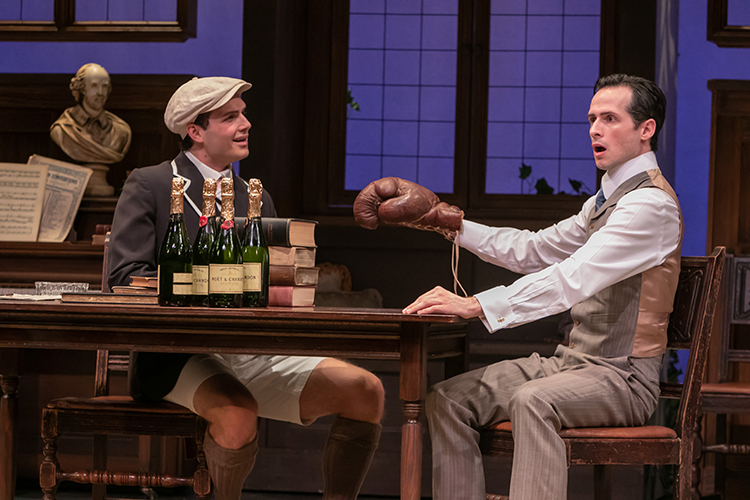“Once again, Joseph Discher proves he is an accomplished director of comedy.”
“With creative, clever direction by Joe Discher.”
By Brandon Thomas
Directed by Joseph Discher
Scenic Design by Brian Prather
Lighting Design by Matthew E. Adelson
Costume Design by Natalie Loveland
Sound Design by Steven Beckel
Production Stage Manager - Kathy Snyder*
THE CAST
John Ahlin* | Stephen Spettigue
Isaac Hicox-Young | Jack Chesney
Peter Simon Hilton* | Brassett
Sally Kingsford | Ela Delahay
Emiley Kiser* | Amy Spettigue
Erica Knight* | Kitty Verdun
David Andrew Macdonald* | Colonel Sir Frances Chesney
Aaron McDaniel* | Jack Chesney
Seamus Mulcahey* | Lord Fancourt Babberly
Erika Rolfsrud* | Donna Lucia D’Alvadorez
*member Actor's Equity
Charley’s Aunt was officially commissioned by the local hunt in Bury St. Edmunds, which sponsored a new play every year for its annual social festivities known as the “hunt Bespeak.” Brandon Thomas’ play was first performed at Theatre Royal Bury St. Edmunds (Suffolk) in February 1892. It was produced by actor W.S. Penley, a friend of Thomas’, who appeared in the principal role of Lord Fancourt Babberley.
Charley’s Aunt broke all historic records for plays of any kind, with an original London run of 1,466 performances across four years, closing on December 19, 1896. It was also a success on Broadway in 1893, where it had another long run. It has toured internationally and has been revived and adapted for films and musicals, including a silent film version starring Sydney Chaplin, a musical version called Where’s Charley? starring Ray Bolger as Charley, with lyrics by Frank Loesser, a televised version by Playhouse 90 with Art Carney as Babbs, and an American Playhouse version in 1987 with Victor Garber as Jack and Charles Grodin as Babbs. Not to mention a 1975 Soviet television version entitled Hello, I’m your Aunt…
Though Brandon Thomas wrote more than a dozen plays and worked often as a character actor, Charley’s Aunt is the work for which he remains best known. He played the role of Sir Colonel Francis Chesney for the first few weeks of the London run of Charley’s Aunt and regularly played the part in later revivals until shortly before his death. In his obituary notice, The Times of London quoted Thomas as having said, “I hoped to go down to fame as a great actor. If I go at all it will be as the author of Charley’s Aunt.”
“We’re in love...no fool of a flirtation business, but the real downright serious thing.”
I must confess that I was unfamiliar with Charley’s Aunt when I was first offered the opportunity to direct it here at The Shakespeare Theatre. As I read it, I cold not understand how the play had escaped my notice. Why had I not seen a production? Strangely enough, it has been rarely produced I the past few decades. Yet it has everything an audience could want in an comedy.
Charley’s Aunt is a classic example of a three-act, fast-paced, incredibly fun romp of a farce; perhaps even a pioneer of the form, having preceded gems like Oscar Wilde’s The Importance of Being Earnest (1895), and Feydeau’s A Flea in Her Ear (1907). It has young lovers, scheming parents and guardians, an unflappable butler, improbable disguises, false identities, witty dialogue, high manners, physical comedy, and cross-dressing. From the moment Jack and Charley enlist their friend to impersonate Charley’s aunt, the play moves from one believable absurd situation to the next with domino-effect alacrity, as the two callee ends try to keep up with the lie they have perpetrated in order to propose to the women they love.
It would be easy to fixate only on the play’s broad comedy, and wind up with only fluff and silliness on stage. But no matter how high a level of preposterousness the play can rise to, at the heart of the play is one powerful theme that grounds it in reality—a force that has at one time or another, made us all do some very foolish things: love. What are the length we will go to for love? What are the sacrifices we will make and the indignities we will suffer for it? And in the end, it is love that makes all the trouble worth it. To me, this is what drives the play’s characters, action, and the comedy itself. Crafting the many moments of comedy with this cast has been a daily dose of fun. But underneath it all has been this theme, which I hope makes your journey through the play just a bit more dear and delightful. It has been a gift to work on a play like this, and to share it with you.
May the laughter it provides be a satisfying tonic for these times.








